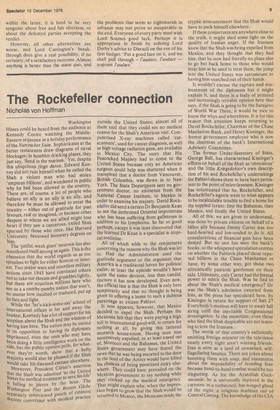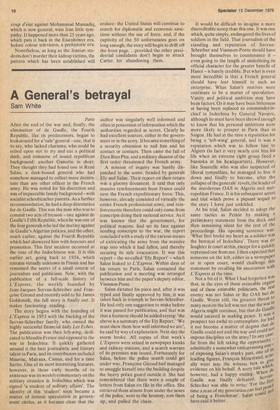The Rockefeller connection
Nicholas von Hoffman
Washington Hisses could be heard from the audience at Kennedy Centre watching the MiddleEastern sequence in a holiday performance of the Nutcracker Suite. Sophisticates at the better restaurants draw diagrams of naval blockages; in humbler drinking places, they just say, 'Send in the marines.' Yet, despite this ubiquitous jingo dance, Edward Kenney did not ruin himself when he called the Shah a violent man who had stolen 'umpteen billions', and wondered in public why he had been allowed in the country, There are, of course, a lot of people who believe an ally is an ally is an ally, and therefore he must be allowed to enter the country – either out of gratitude for past favours, real or imagined, or because other despots to whom we are allied might lose heart if they saw a cancerous, exiled Shah spurned by those who once, like Harvard University, bestowed honorary degrees on him, The 'pitiful, weak giant' neurosis has also manifested itself among us again. This is the obsession that the world regards us as too Spineless to fight for either honour or interest. Two major wars and countless military actions since 1945 have convinced others not to take our threats and grumbles lightly, but there are countless millions here who see us a a namby-pamby nation that won't, no matter how insulted or traduced, put up its fists and fight. While the 'let's-kick-some-ass' school of International affairs is far and away the loudest, Kennedy has a lot of support for his seeptism about the Shah and the wisdom of having him here. The nation may be united in its opposition to having its diplomats imprisoned, even the ones who may have been doing a little intelligence work on the Side, but the public opinion polls, for what ever they're worth, show that a hefty majority would also be pleased if the Shah would take his diseased carcase elsewhere. Moreover, President Carter's assertion that the Shah was admitted 'to the United States for medical treatment to save his life' falling to pieces by the hour. The Washington Post and the BOS1011 Globe S,eparately interviewed panels of eminent doctors conversant with medical practice outside the United States; almost all of them said that they could see no medical reason for the Shah's American visit. Corn puterised X-ray machines called 'catscanners', used for cancer diagnosis, as well as high voltage radiation guns, are available in Mexico City. The story that His Peacocked Majesty had to come to the United States because only an American surgeon could help was shattered when it transpired that a doctor from Vancouver, British Columbia, was flown in to New York. The State Department sent no government doctor, no eminence from the National Cancer Institute, to Mexico in order to examine his majesty, David Rockefeller did send a certain Dr Benjamin Kean to see the dethroned Oriental impotentate who has been suffering from gallstones in addition to his lymphoma. So far so good perhaps, except it was later discovered that the learned Dr Kean is a specialist in tropical medicine.
All of which adds to the conjectures concerning the reasons why the Shah was let in. Had the Administration used the gratitude argument or the argument that America is a traditional haven for political exiles, at least the episode wouldn't have quite the same devious, less than candid, tincture it has now developed. Even now, the official line is that the Shah is only here temporarily and that no thought is being given to offering a home to such a dubious personage as citizen Pahlavi.
It now appears, however, that Mexico decided to expel the Shah. Perhaps the Mexicans felt that they were paying a high toll in International good-will, in return for nothing at all, by giving this tattered monarch house-room. Having seen him successively expelled, or at least eased out of, Morocco and the Bahamas, the United States government may have feared the news that he was being escorted to the door in the land of the Aztecs would have killed his chances of being permitted entry elsewhere. They could have prevailed on the Mexican government to say nothing while they cooked up the medical emergency. That might explain why, when the impression began to grow that the Shah would be returned to Mexico, the Mexicans made the cryptic announcement that the Shah would have to park himself elsewhere.
If these conjectures are anywhere close to the truth, it might shed some light on the quality of Iranian anger. If the Iranians knew that the Shah was being expelled from Mexico, and they thought that they had him, that he now had literally no place else to go but back home to those who would treat him as he used to treat them, the jump into the United States was tantamount to having him snatched out of their hands.
It wouldn't excuse the capture and mistreatment of the diplomats but it might explain it, and there is a body of irritated and increasingly irritable opinion here that says, if the Shah is going to be the Sarajevo of World War Three, it would be nice to know the whys and wherefores. It is for this reason that attention keeps returning to David Rockefeller, Chairman of the Chase Manhattan Bank, and Henry Kissinger, the former government employee who is now the chairman of the bank's International Advisory Committee.
The former Under-Secretary of State, George Bali, has characterised Kissinger's efforts on behalf of the Shah as 'obnoxious' and the little Kriegsdoktor's own description of his and Rockefeller's undertakinp for Pahlavi shows them to have been persistent to the point of relentlessness. Kissinger has volunteered that he, Rockefeller, and Rockefeller's agents went to what appears to be incalculable trouble to find a home for the toppled tyrant: first the Bahamas, then Mexico, and finally the United States, All of this, we are given to understand, was done by private citizens on behalf of a fallen ally because Jimmy Carter was too hard-hearted and low-souled to. do it. All considerations of financial gain have been denied. But no one has seen the bank's books, so the whispered speculation centres on whether the Pahlavis placed those reputed billions in the Chase Manhattan or have, by some other way, got those two altruistically patriotic gentlemen on their side. Ultimately, only Carter had the formal power to admit the Shah. Was he lied to about the Shah's medical emergency? Or was the Shah's admission extorted from him, as the press has speculated here, by Kissinger in return for support of Salt 2?
Everybody's motives will have to await full airing until the inevitable Congressional investigation. In the meantime, even those who find the Shah despicable are not learning to love the Iranians.
The words of that country's sadistically smirking foreign minister on the television nearly every night aren't winning friends. Iran is seen as a land of unwashed, selfflagellating fanatics. There are jokes about bombing them with soap, and statements about the impossibility of invading Iran because hand-to-hand combat would be too disgusting. As for the Ayatollah Cock amamie, he is universally depicted in the cartoons as a turbanned, bat-winged ghoul of the night, a religious madman out of Central Casting. The knowledge of the CIA coup d'itat against Mohammad Mussadiq, which is now general, wins Iran little sympathy. It happened more than 25 years ago, which puts it back in the Eisenhower era. before colour television, a prehistoric era.
Nonetheless, as long as the Iranian students don't murder their kidnap victims, the pattern which has been established will endure: the United States will continue to search for diplomatic and economic sanctions without the use of force, and, if the captivity of the 50 unfortunates goes on long enough, the story will begin to drift off the front page. . .provided the other presidential candidates don't begin to attack Carter for abandoning them.



































 Previous page
Previous page